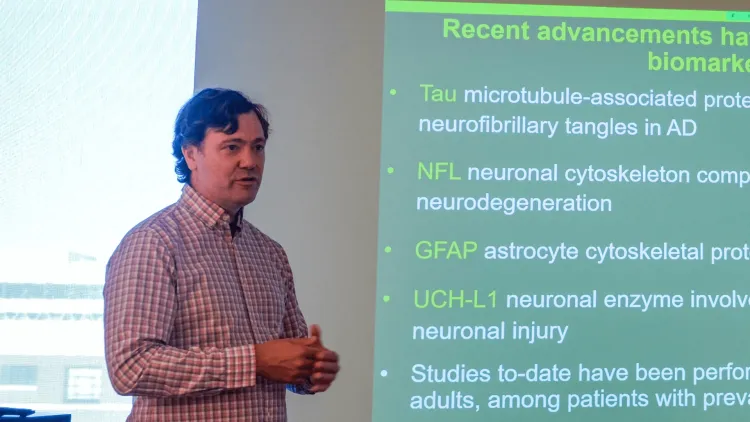Impactful research by scientists at the University of Vermont has identified new blood tests that can predict a person’s risk for cognitive impairment that can lead to dementia—long before people notice memory issues. These blood tests use an emerging technology able to detect leakage of tiny amounts of proteins, called biomarkers, from damaged brain cells. The findings, published in Neurology, the journal of the American Academy of Neurology, show that brain changes happen decades before the onset of symptoms.
“Findings from this research provide new knowledge that might allow us to help people avoid Alzheimer’s disease and related dementias as they age,” says study co-author Nels Olson, Ph.D., M.P.H., associate professor of pathology and laboratory medicine at the University of Vermont Larner College of Medicine. Olson collaborates closely with Vermont Center for Cardiovascular and Brain Health Co-Director Mary Cushman, M.D., M.Sc., University Distinguished Professor of Medicine, who is senior author of this study. Additional co-authors include scientists at the University of Cincinatti, the University of Alabama, and other institutions.
Using blood tests to assess risk for future cognitive problems can help people identify a need for prevention treatments and lifestyle modifications. Evidence shows that maintaining a healthy lifestyle that includes staying physically active, eating a healthy diet, avoiding tobacco and excessive alcohol consumption, and controlling high blood pressure can ward off dementia. Staying mentally and socially active can also reduce the risk.
The investigators examined a subset of participants from the ongoing Reasons for Geographic and Racial Differences in Stroke (REGARDS) study. Funded by the National Institutes of Health, REGARDS has followed 30,239 Black and white adults since 2003 to identify factors that lead to stroke and cognitive problems. For the current study, researchers looked at four lab tests in blood of REGARDS participants who had no baseline cognitive impairment and followed them for about 12 years. They found that three tests—neurofilament light chain (NFL), glial fibrillary acidic protein (GFAP), and ubiquitin carboxy-terminal hydrolase L1 (UCH-L1)—were very good at predicting who would develop memory problems later.

“Findings from this research provide new knowledge that might allow us to help people avoid Alzheimer’s disease and related dementias as they age.” — Nels Olson, Ph.D., M.P.H.
As dementia rates continue to rise with the aging of the U.S. population, a reliable test to predict it will become increasingly important. The U.S. population is older today than at any previous time in history and, over the next 25 years, the number of adults older than 65 is expected to increase by 50 percent, putting more people at risk for cognitive decline. Evidence shows that women, Black people, and Hispanic people have a higher risk of developing dementia as they age.
Previous investigations of these blood tests mostly included patients referred to memory clinics with cognitive problems, who were predominantly non-Hispanic white participants, limiting translation to the general population. This new study helps clarify the role of the blood tests in predicting future cognitive decline in the general population years before the appearance of symptoms. Because the REGARDS data is from a national sample, the findings are more geographically generalizable than previous studies.
Future research will seek to confirm these findings in larger studies, see if findings apply at a younger age, and identify additional blood tests that could be used in clinical practice.
Read the study, "Circulating Biomarkers of Neurodegeneration and Risk of Cognitive Impairment"Research like this has contributed to the University of Vermont’s designation by the Carnegie Classification of Institutions of Higher Education as an R1 institution, placing it in the top tier of research universities in the U.S.

